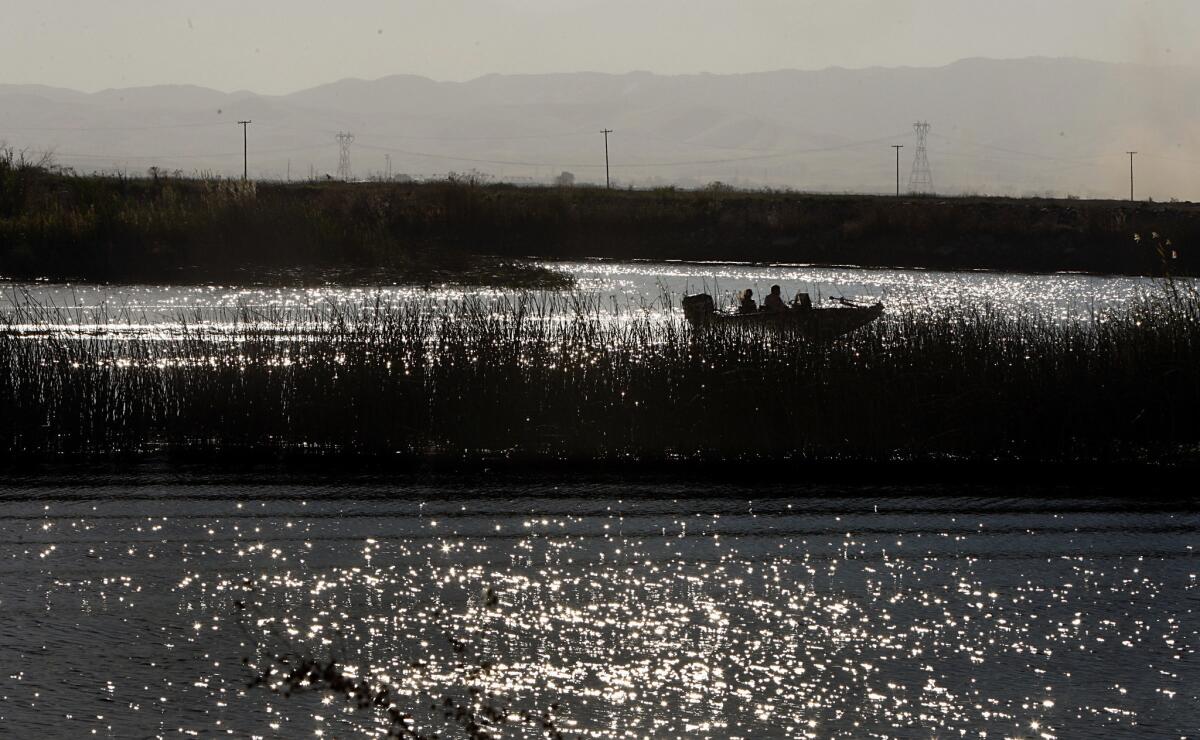Some growers can divert water again amid drought, regulators say

Boaters navigate the Middle River between Bacon Island and Lower Jones Tract in the Sacramento River Delta.
- Share via
State regulators have lifted water-use restrictions that they had previously imposed on a handful of California’s most senior rights holders during the drought.
The move Friday marks the first time the state Water Resources Control Board has eased up on those growers since ordering them to stop diverting water in June.
More than 200 water users with rights dating back to between 1903 and 1913 can now begin diverting water from the Sacramento and Feather River watersheds and other parts of the Sacramento-San Joaquin River Delta, officials said.
But restrictions remain in effect for more junior water rights holders in those areas. Growers with so-called “pre-1914” water rights in the Yuba, American and San Joaquin river watersheds are also still prohibited from diverting the water there, regulators said.
“The agricultural water demand has reduced sufficiently now in some of these watersheds [such] that there is water for additional water users,” said Kathy Mrowka, the state board’s program manager for water rights enforcement.
In California and the West, most rights to surface water are based on when the water was first diverted and used, a system known as “first in time, first in right.”
The state didn’t start issuing water diversion permits until 1914, the dividing line between senior and junior rights.
During times of drought, when there isn’t sufficient flow to satisfy all demand, those with junior rights are cut first to leave water for those with older claims.
In February, water regulators sent notices to growers with senior rights to watersheds in the Sacramento and San Joaquin river basins. The notices ordered the users to submit monthly reports on how much water they were diverting.
Two months later, the state began halting diversions made in the same area by many junior rights holders for the second consecutive year.
Then, in June, the water board directed hundreds of growers and irrigation districts with rights dating to 1903 to stop taking supplies from Central Valley rivers and streams. It marked the first time since the 1976-77 drought that the state board moved to stop withdrawals by senior diverters with rights more than a century old.
Overall, the four-year drought has forced the board to curtail the rights of more than 9,000 growers and irrigation districts between April and July of this year, officials said.
Mrowka said the information provided by the senior water-rights holders over the past several months gave regulators “real-time data” on water supply and demand. The September data was encouraging enough that regulators decided to ease up, she said.
“As we come into the rainfall season we would expect that rainfall events will allow us to make additional decisions like this,” Mrowka said.
Still, she cautioned against excessive celebration.
“I would not characterize this drought as being over whatsoever,” Mrowka said. “Some parties are going to be glad to see today’s action, and unfortunately, because the drought is continuing, today’s action is quite limited.”
Follow @ByMattStevens for coverage of the California drought and breaking news.
More to Read
Sign up for Essential California
The most important California stories and recommendations in your inbox every morning.
You may occasionally receive promotional content from the Los Angeles Times.










